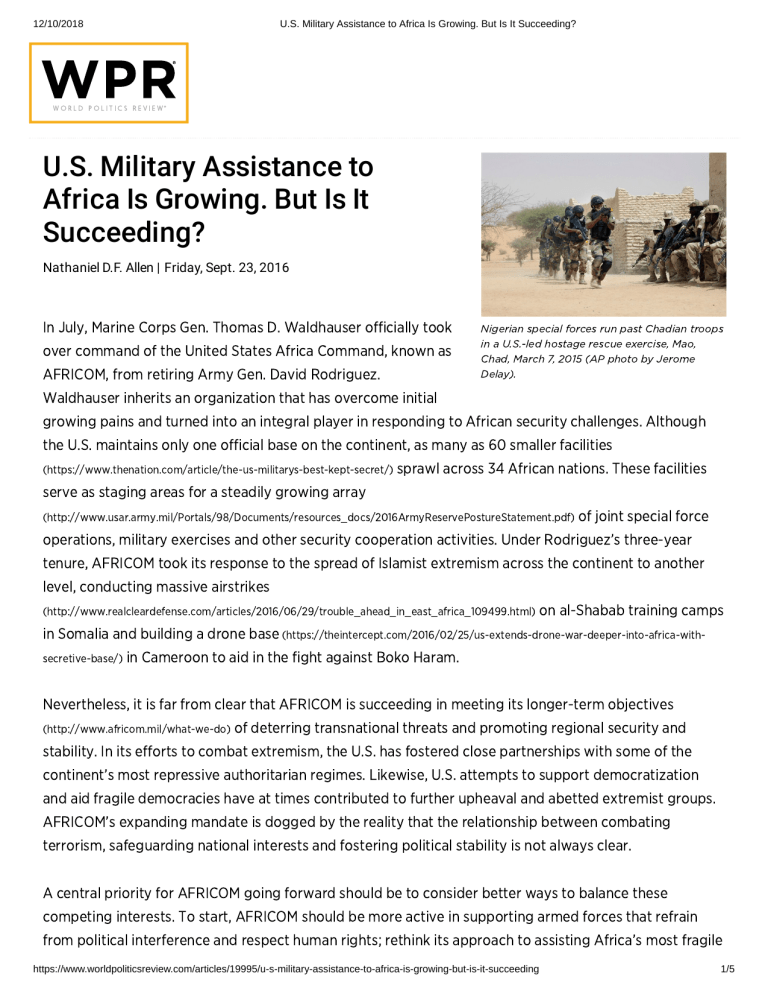
12/10/2018
U.S. Military Assistance to Africa Is Growing. But Is It Succeeding?
U.S. Military Assistance to
Africa Is Growing. But Is It
Succeeding?
Nathaniel D.F. Allen | Friday, Sept. 23, 2016
In July, Marine Corps Gen. Thomas D. Waldhauser officially took
over command of the United States Africa Command, known as
AFRICOM, from retiring Army Gen. David Rodriguez.
Nigerian special forces run past Chadian troops
in a U.S.-led hostage rescue exercise, Mao,
Chad, March 7, 2015 (AP photo by Jerome
Delay).
Waldhauser inherits an organization that has overcome initial
growing pains and turned into an integral player in responding to African security challenges. Although
the U.S. maintains only one official base on the continent, as many as 60 smaller facilities
(https://www.thenation.com/article/the-us-militarys-best-kept-secret/)
sprawl across 34 African nations. These facilities
serve as staging areas for a steadily growing array
(http://www.usar.army.mil/Portals/98/Documents/resources_docs/2016ArmyReservePostureStatement.pdf)
of joint special force
operations, military exercises and other security cooperation activities. Under Rodriguez’s three-year
tenure, AFRICOM took its response to the spread of Islamist extremism across the continent to another
level, conducting massive airstrikes
(http://www.realcleardefense.com/articles/2016/06/29/trouble_ahead_in_east_africa_109499.html)
on al-Shabab training camps
in Somalia and building a drone base (https://theintercept.com/2016/02/25/us-extends-drone-war-deeper-into-africa-withsecretive-base/)
in Cameroon to aid in the fight against Boko Haram.
Nevertheless, it is far from clear that AFRICOM is succeeding in meeting its longer-term objectives
(http://www.africom.mil/what-we-do)
of deterring transnational threats and promoting regional security and
stability. In its efforts to combat extremism, the U.S. has fostered close partnerships with some of the
continent’s most repressive authoritarian regimes. Likewise, U.S. attempts to support democratization
and aid fragile democracies have at times contributed to further upheaval and abetted extremist groups.
AFRICOM’s expanding mandate is dogged by the reality that the relationship between combating
terrorism, safeguarding national interests and fostering political stability is not always clear.
A central priority for AFRICOM going forward should be to consider better ways to balance these
competing interests. To start, AFRICOM should be more active in supporting armed forces that refrain
from political interference and respect human rights; rethink its approach to assisting Africa’s most fragile
https://www.worldpoliticsreview.com/articles/19995/u-s-military-assistance-to-africa-is-growing-but-is-it-succeeding
1/5
12/10/2018
U.S. Military Assistance to Africa Is Growing. But Is It Succeeding?
states; and invest in the analytical capacity needed to better weigh the costs of engagement against the
political risks.
Although AFRICOM has succeeded in helping to enhance the military capabilities of many countries, U.S.
military partnerships have also fostered numerous uncomfortable alliances. Three of the top 10 recipients
of U.S. government Foreign Military Financing (http://www.state.gov/t/pm/ppa/sat/c14560.htm) over the past five
years were autocratic regimes in Djibouti, Ethiopia and Uganda. The U.S. also relies heavily on Chad,
Cameroon and Mauritania—all notorious for their repression—to fight Islamist terrorist and insurgent
groups across the Sahel.
Such regimes have often used U.S. support as an opportunity
(http://www.rand.org/pubs/research_reports/RR808.html)
to run roughshod over domestic opposition and abuse
human rights. The current government in Ethiopia and the previous one in Mauritania both passed antiterrorism laws (http://www.cfr.org/content/thinktank/Lyman_chapter_Terrorism.pdf) to cozy up to Western security
partners, and then cracked down at home against protesters, political parties and members of the media
that dared to criticize their policies. Units in both the militaries of Chad and Cameroon that have received
U.S. training have reportedly been involved (https://www.thenation.com/article/the-united-states-is-training-militaries-withdubious-human-rights-records-again/)
in the torture and killing of civilians.
A number of American efforts to support democratic movements or shore up weak democratic allies in
Africa have been just as fraught. The death of U.S. Ambassador Chris Stevens and Libya’s rise as the
Islamic State’s next safe haven after U.S.-supported efforts overthrew Moammar Gadhafi have made that
country Washington’s biggest self-admitted strategic failure (http://www.bbc.com/news/world-us-canada-36013703).
Gadhafi’s fall also created additional ripple effects beyond Libya. In Nigeria, Gadhafi’s arms stockpiles,
including rocket-propelled grenades and anti-aircraft guns, were shipped across trade routes in the Sahel
and into the arms of Boko Haram (http://www.reuters.com/article/us-libya-un-arms-idUSTRE80P1QS20120126), where they
helped the insurgents outmatch poorly equipped government security forces. In Mali and Niger, former
Tuareg fighters once supported by Gadhafi slipped across the border, where they fomented rebellion and
paved the way for the takeover by al-Qaida-affiliated insurgents of much of northern Mali in 2012.
Military spending in sub-Saharan Africa has nearly
doubled since 2007, a fact that has more to do with
the region’s growing economies than the U.S.
presence.
https://www.worldpoliticsreview.com/articles/19995/u-s-military-assistance-to-africa-is-growing-but-is-it-succeeding
2/5
12/10/2018
U.S. Military Assistance to Africa Is Growing. But Is It Succeeding?
Despite these setbacks, a policy of U.S. retrenchment isn’t desirable from a strategic standpoint, and it
wouldn’t likely make citizens across Africa any more safe. First, not all of AFRICOM’s engagements have
ended in failure. Although there is plenty of skepticism (http://muse.jhu.edu/article/519190/pdf) over U.S. military
involvement, many African governments are taking advantage of U.S. training, equipment, intelligence
and special operations forces capabilities to respond to crises and fight conflicts. U.S. efforts to support
the African Union Mission in Somalia, or AMISOM, have been an unqualified success, pushing al-Shabab
militants out of most of their formerly held territory, including the capital, Mogadishu. So have anti-piracy
task forces in the Gulf of Aden and Gulf of Guinea. Amid the Ebola crisis, AFRICOM sent some 3,000
troops (http://www.nytimes.com/2014/09/16/world/africa/obama-to-announce-expanded-effort-against-ebola.html) to Liberia to
assist with efforts to combat the disease at the explicit request of Liberia’s president, as local resources
were being overwhelmed.
Second, the U.S. cannot back out of its current commitments so easily. Just about every authoritarian
regime the U.S. works with plays a critical role in regional security. Djibouti hosts the largest and only
official American base on the continent. Ethiopia hosts the headquarters of the African Union. Uganda
plays a leading role (http://www.rand.org/pubs/research_reports/RR808.html) in providing peacekeeping troops to
fight al-Shabab in Somalia. The armies of Chad and Cameroon have been instrumental in containing Boko
Haram. And despite these regime’s ugly human rights records, the truth is armies of other fragile states
and nascent democracies across Africa fare little better. From the 319th Commando Battalion
(https://www.washingtonpost.com/world/national-security/us-trained-congolese-troops-committed-rapes-and-other-atrocities-unsays/2013/05/13/9781dd88-bbfe-11e2-a31d-a41b2414d001_story.html)
in the Democratic Republic of the Congo to the
Kenyan Anti-Terror Police Unit (https://www.hrw.org/news/2014/08/18/kenya-killings-disappearances-anti-terror-police), the
involvement of U.S.-trained units in the rape, torture, disappearances and extrajudicial killings of
noncombatants is unfortunately all too common.
Finally, despite concerns that AFRICOM’s presence will “militarize” the continent, the U.S. does have
legitimate strategic interests in being engaged. Military spending in sub-Saharan Africa has nearly
doubled since 2007, a fact that has more to do with the region’s growing economies than the U.S.
presence. If African countries do not receive their military equipment and training from the U.S. or other
Western sources, they can go elsewhere, including to rivals such as China and Russia, and have done so in
the past.
A more viable approach for AFRICOM would be to focus less on crisis response and more on its longerterm mission of preventing conflict and fostering political stability. Washington clearly considers the
countries that currently receive the most U.S. military aid to be strategic priorities. But little is done to
systematically recognize or reward countries whose armed forces respect the principles of civilian control
and human rights. The U.S. might consider establishing a program or series of funds for that purpose, with
explicit and transparent guidelines for steps that the armed forces of a partner country would need to
https://www.worldpoliticsreview.com/articles/19995/u-s-military-assistance-to-africa-is-growing-but-is-it-succeeding
3/5
12/10/2018
U.S. Military Assistance to Africa Is Growing. But Is It Succeeding?
take to qualify, akin to the Millennium Challenge Corporation’s approach to selecting candidates for U.S.
poverty-alleviation assistance.
AFRICOM also needs to rethink its approach to providing military equipment and weapons to Africa’s
most fragile states. There is little evidence (http://securityassistance.org/blog/study-us-military-aid-may-be-ineffectiveautocratic-and-weak-governments)
to suggest that such assistance is effective, and the defections of U.S.-trained
units and an abundance of ill-secured arms have abetted many of the continent’s worst conflicts. What
good are weapons systems if, as if often the case, they are not well maintained or don’t reach the front
lines because of corruption or mismanagement? U.S. engagement should try to introduce more autonomy
and transparency into the security sector and focus more on law enforcement and counternarcotics,
which appear to be more effective than traditional security assistance.
Finally, AFRICOM needs to invest more in improving its own analytical capabilities. Rigorous monitoring
and evaluation practices now common across other forms of foreign aid are the exception in the security
sector. Most programs lack even basic theories of change (http://www.rand.org/pubs/research_reports/RR808.html)
that directly link the inputs provided to African partners to basic outcomes and long-term impacts the
U.S. expects to achieve. Much more could be done to identify, monitor and mitigate political risks inherent
in providing security assistance. Rewarding specialization, hiring more regional experts and embedding
U.S. personnel by expanding the U.S. Ministry of Defense Advisors program in Africa would help AFRICOM
gain much-needed local knowledge and expertise.
Ultimately, AFRICOM cannot defend itself or its partners against every conceivable contingency. But it
can, and should, be doing much more to understand, plan for and mitigate the political risks of its
expanding mandate.
Nathaniel D.F. Allen is a doctoral candidate in international relations at the Johns Hopkins University’s School of Advanced
International Studies and a 2016-2017 Jennings Randolph Peace Fellow at the United States of Institute of Peace.
MORE WORLD POLI TI CS REV I EW
Related
https://www.worldpoliticsreview.com/articles/19995/u-s-military-assistance-to-africa-is-growing-but-is-it-succeeding
4/5
12/10/2018
Why the Military
Continues to Cast a
Long Shadow Over
African Politics
U.S. Military Assistance to Africa Is Growing. But Is It Succeeding?
U.S.-Senegal Deal
Reflects Changing
Threat Landscape in
West Africa
Boko Haram Has
Faded, but Nigeria
Will Struggle to Finish
the Group Off
As the U.S.
Disengages, Russia
Ramps Up Aid and
Arms Sales to Sub(https://www.worldpoliticsreview.com/articles/21467/why(http://www.worldpoliticsreview.com/trend(https://www.worldpoliticsreview.com/insights/26050/b
Saharan Africa
the-military-continues-to-cast-a-long-shadow-over-africanlines/18713/u-s-senegal-deal-re
haram-has-faded-but-nigeria-will-struggle-toects(https://www.worldpolitics
nish-the
politics)
changing-threat-landscape-in-west-africa)
group-o )
the-u-s-disengages-russiato-sub-saharan-africa)
Explore WPR
In Today’s Security
Environment,
Deterrence Is
Becoming Personal
Mexico Begins an Era Against the Odds,
Don’t Count on the
of Uncertainty Under African Migrants Put Truce Holding in
AMLO
Down Roots in South Trump’s Trade War
(https://www.worldpoliticsreview.com/articles/26886/mexicoAmerica
With China
(https://www.worldpoliticsreview.com/articles/26934/inbegins-an-era-of-uncertainty-under-amlo)
(https://www.worldpoliticsreview.com/articles/26901/a
(https://www.worldpolitics
today-s-security-environment-deterrence-is-becoming- the-odds-african-migrants-put-down-roots-in-south-am
t-count-on-the-truce-holdi
personal)
china)
Powered by
(https://contextly.com)
© 2018, World Politics Review LLC. All rights reserved.
https://www.worldpoliticsreview.com/articles/19995/u-s-military-assistance-to-africa-is-growing-but-is-it-succeeding
5/5



